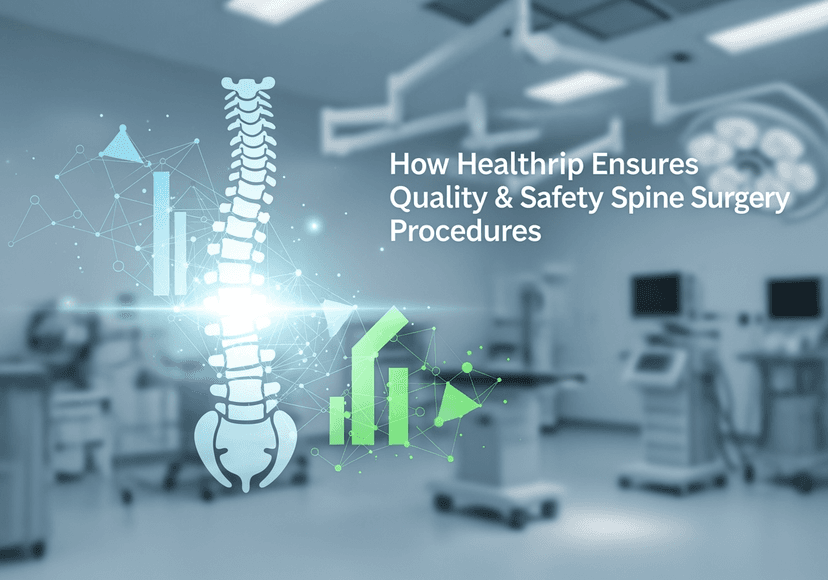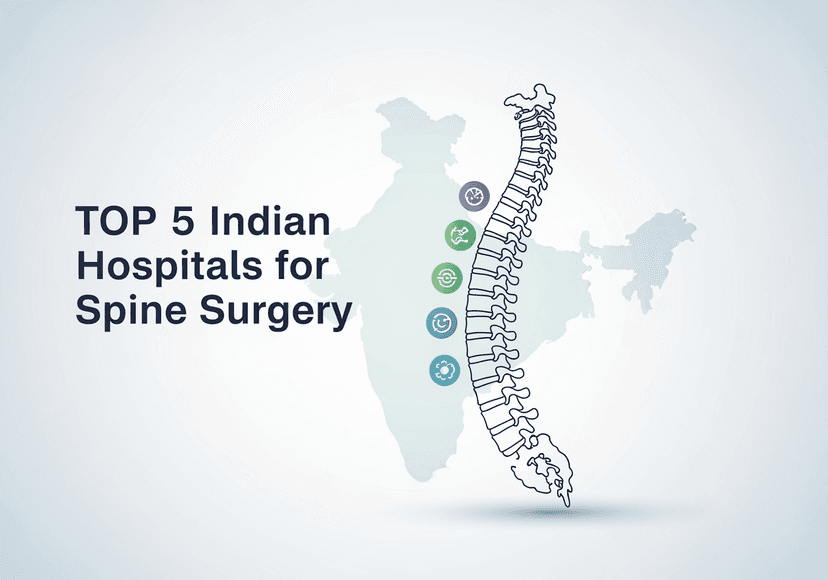
Considering Spine Surgery? What You Need to Know
06 Nov, 2023
 Healthtrip
HealthtripSpine surgery is a significant medical procedure that can be life-changing for many individuals suffering from spine-related conditions. Whether you're experiencing chronic back pain, spinal deformities, herniated discs, or other spine issues, the decision to undergo spine surgery is not one to be taken lightly. This article will provide you with essential information to consider when contemplating spine surgery, including the types of surgeries, potential risks, and alternatives to surgery.
Understanding the Types of Spine Surgery
Before making a decision, it's crucial to understand the various types of spine surgeries available. Each type of procedure is designed to address specific spine-related problems. Some common spine surgeries include:
Most popular procedures in India
1. Discectomy
A discectomy involves the removal of a herniated or damaged disc in the spine. This procedure aims to relieve pressure on nerves and alleviate symptoms such as pain, numbness, or weakness.
2. Fusion Surgery
Fusion surgery is performed to stabilize and fuse two or more adjacent vertebrae. It's often recommended for conditions like spondylolisthesis and degenerative disc disease.
Wellness Treatments
Give yourself the time to relax
Lowest Prices Guaranteed!

Lowest Prices Guaranteed!
3. Decompression Surgery
Decompression surgery, like laminectomy or laminotomy, aims to relieve pressure on the spinal cord or nerves. It is commonly performed for conditions like spinal stenosis.
4. Scoliosis Surgery
Scoliosis surgery is reserved for individuals with severe spinal deformities. It involves straightening and fusing the spine to correct the curvature.
5. Artificial Disc Replacement
This surgery involves replacing a damaged or herniated disc with an artificial one, preserving the natural motion of the spine.
Understanding the specific type of surgery your condition requires is essential in making an informed decision.
Assessing the Risks and Benefits
Spine surgery, like any medical procedure, comes with both risks and potential benefits. Before undergoing surgery, consider the following:
Benefits:
- Pain Relief: Successful spine surgery can provide significant pain relief and improve your overall quality of life.
- Improved Mobility: Some surgeries can restore or enhance your ability to move and function.
- Preventing Further Damage: Surgery can prevent the worsening of certain spine conditions, especially when conservative treatments have failed.
Risks:
- Infection: Like any surgery, there is a risk of infection at the surgical site.
- Nerve Damage: Spine surgery carries the risk of damaging nearby nerves, which can lead to new or worsening symptoms.
- Failed Surgery: There is no guarantee of a successful outcome, and the surgery may not provide the expected relief.
- Rehabilitation: Recovery from spine surgery can be challenging, requiring physical therapy and lifestyle adjustments.
It's essential to have a thorough discussion with your surgeon to weigh the potential risks and benefits specific to your condition.
Considering Non-Surgical Alternatives
Surgery is not always the first or only option for treating spine conditions. There are several non-surgical alternatives that may be effective, including:
1. Physical Therapy: A physical therapist can provide exercises and techniques to strengthen the spine and alleviate pain.
2. Medications: Pain medications, anti-inflammatories, and muscle relaxants may help manage symptoms.
3. Epidural Injections: These injections can provide temporary relief by reducing inflammation and pain.
4. Lifestyle Modifications: Maintaining a healthy weight, practicing good posture, and avoiding smoking can significantly improve spine health.
5. Alternative Therapies: Options such as chiropractic care, acupuncture, and yoga may offer relief for some individuals.
It's important to explore these non-surgical options before committing to spine surgery. Your doctor can help guide you in making the right choice based on your specific condition and needs.
The Importance of a Second Opinion
The decision to undergo spine surgery is a critical one that can have a profound impact on your quality of life. One of the most crucial steps in this process is seeking a second opinion from another qualified spine specialist. While you might feel pressured to move forward quickly, taking the time to consult a second expert can make all the difference. In this section, we'll explore why obtaining a second opinion in spine surgery is so vital.
1. Confirmation of Diagnosis
Getting a second opinion can help ensure that your initial diagnosis is accurate. Misdiagnoses can lead to unnecessary surgeries or the wrong type of surgery, potentially causing more harm than good. A second opinion can confirm or provide a different perspective on your condition, helping to establish the correct course of treatment.
2. Exploring Alternative Treatment Options
Different surgeons may have varying approaches to treating spine conditions. Seeking a second opinion allows you to explore alternative treatment options that you might not have considered. There may be less invasive procedures, new technologies, or innovative therapies that a different specialist can recommend, giving you a broader perspective on your treatment choices.
3. Verifying the Recommended Surgery
Even if your diagnosis is correct, the recommended surgical approach can vary between surgeons. It's essential to understand why one surgeon might recommend a specific procedure over another. A second opinion can provide insight into the reasoning behind the recommended surgery and help you feel more confident about the course of action you choose.
4. Reducing Risk
Spine surgery, like any surgical procedure, carries risks. Seeking a second opinion can help you identify any potential risks associated with the surgery and allow you to weigh them against the benefits. Understanding the full scope of the procedure and its risks is critical for making an informed decision about whether to proceed.
5. Confidence and Peace of Mind
A second opinion can provide peace of mind and confidence in your decision. It allows you to compare the recommendations of two experts, ensuring that you are making the best choice for your situation. Knowing that you've explored all your options can alleviate anxiety and stress associated with major surgery.
6. Empowerment and Control
Seeking a second opinion empowers you to take control of your healthcare decisions. It's your body, your health, and your future, and you have the right to be actively involved in your treatment plan. A second opinion enables you to make a well-informed choice that aligns with your goals and concerns.
7. Potential Cost Savings
While a second opinion may require an additional doctor's visit, it can potentially save you money in the long run. It can help you avoid unnecessary or inappropriate surgeries and treatments, which can be costly, both financially and in terms of your health.
Preparing for Spine Surgery
If you've decided that spine surgery is the right path for you, it's essential to be well-prepared. Here are some key steps to consider:
1. Choose a Skilled Surgeon
Selecting the right surgeon is critical to the success of your spine surgery. Look for a board-certified, experienced surgeon with a track record of performing the specific type of surgery you need. Research their credentials, read patient reviews, and ask for referrals if possible. Establishing trust with your surgeon is crucial, so don't hesitate to ask questions and discuss any concerns you may have.
2. Preoperative Assessment
Before your surgery, you'll undergo a comprehensive preoperative assessment. This may include blood tests, imaging studies, and a physical examination to ensure you are in the best possible condition for the procedure.
3. Understand the Surgical Process
Take the time to understand the surgical process itself. Your surgeon should explain the procedure in detail, including the anesthesia used, the incision, and the expected duration of the surgery. Knowing what to expect can help alleviate anxiety and make you feel more in control.
4. Plan for Recovery
Recovery from spine surgery can be a lengthy process. You'll need to plan for post-operative care, which may include assistance from family members, home modifications, and a rehabilitation program. It's essential to follow your surgeon's postoperative instructions carefully to optimize your recovery.
5. Discuss Anesthesia and Pain Management
Have a discussion with your anesthesia team about the type of anesthesia you'll receive. Additionally, talk with your surgeon about pain management options after the surgery. Effective pain management can make your recovery more comfortable.
6. Arrange Transportation
After spine surgery, you will not be able to drive, so arrange for transportation to and from the hospital on the day of the surgery. You may also need assistance with daily activities during the initial days of your recovery.
7. Emotional Preparation
Preparing for spine surgery is not just physical; it's emotional as well. It's normal to feel anxious or stressed before a major medical procedure. Consider discussing your concerns and fears with a therapist, counselor, or a support group. Emotional preparation can positively impact your overall experience.
Postoperative Recovery
The recovery process for spine surgery can vary depending on the type of procedure, your overall health, and your surgeon's recommendations. Here are some general considerations for your postoperative recovery:
- Follow your surgeon's instructions carefully, including any restrictions on activities, physical therapy, and medication management.
- Expect a gradual return to normal activities. It's essential to be patient with yourself and not rush the recovery process.
- Attend all follow-up appointments with your surgeon to monitor your progress and address any concerns or complications.
- Communicate openly with your healthcare team about your recovery, any new symptoms, or issues that may arise.
- Maintain a healthy lifestyle, including a balanced diet, regular exercise (as recommended by your surgeon), and avoiding smoking.
Long-Term Spine Health
Spine surgery is a significant step in addressing specific issues, but it's also a part of your lifelong journey towards maintaining spine health. To ensure a successful recovery and minimize the risk of future spine problems, consider the following:
1. Regular Follow-Up Care
Continued follow-up care with your surgeon is essential. Even after you've recovered, periodic check-ups can help detect any potential issues early and address them promptly.
2. Physical Activity and Exercise
Physical activity and exercise, under the guidance of a physical therapist or healthcare professional, can be instrumental in maintaining spine health. Strengthening the muscles supporting your spine and improving flexibility can help prevent future problems.
3. Proper Posture and Ergonomics
Pay attention to your posture and ergonomics, both at work and during daily activities. Maintaining good posture can relieve stress on your spine and reduce the risk of pain and injury.
4. Weight Management
Maintaining a healthy weight is crucial for spine health. Excess weight can put additional stress on your spine, increasing the risk of pain and degenerative conditions.
5. Avoid Smoking
If you smoke, consider quitting. Smoking can hinder the body's ability to heal, and it's associated with an increased risk of complications in spine surgery and spine-related issues in general.
6. Pain Management
If you experience ongoing pain after surgery, discuss long-term pain management strategies with your healthcare provider. It's essential to manage pain effectively to maintain your overall quality of life.
Conclusion
Deciding to undergo spine surgery is a significant decision that should be made after careful consideration of your specific condition, risks, benefits, and alternatives. Understanding the type of surgery you need, choosing a skilled surgeon, and thorough preoperative and postoperative preparation are all essential components of a successful spine surgery journey.
Spine surgery can provide much-needed relief and significantly improve your quality of life. However, it's also an integral part of your broader commitment to long-term spine health. Following the guidance of your healthcare team, adopting a healthy lifestyle, and maintaining good habits can help ensure that you enjoy the benefits of your surgery for years to come.
Related Blogs

How Healthtrip Ensures Quality & Safety in Spine Surgery Procedures
Detailed guide on spine surgery, featuring doctors, hospitals, risks, recovery,

End-to-End Logistics for Spine Surgery with Healthtrip's Support
Detailed guide on spine surgery, featuring doctors, hospitals, risks, recovery,

Healthtrip's Care Coordinators: Your Support During Spine Surgery
Detailed guide on spine surgery, featuring doctors, hospitals, risks, recovery,

Top 5 Indian Hospitals for Spine Surgery
Detailed guide on spine surgery, featuring doctors, hospitals, risks, recovery,

Post-Spine Surgery Diet and Lifestyle Tips
Detailed guide on spine surgery, featuring doctors, hospitals, risks, recovery,

Common Risks in Spine Surgery and How Healthtrip Manages Them
Detailed guide on spine surgery, featuring doctors, hospitals, risks, recovery,










